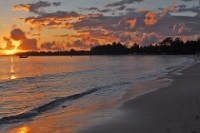
Pemba is a port town and the capital of the Cabo Delgado Province in the North of Mozambique. It has banks, patisseries, supermarkets, and restaurants, yet it retains a ramshackle feel with its potholed streets.
The town is built over rolling hills and most people live in wooden huts, set among the many impressive baobab trees. The history of the Cabo Delgado province and its people lies in many centuries of African, Arab, and Portuguese sailing, trading, and settling.
The Niassa Company founded Pemba in 1904 as Porto Amelia, named after a queen of Portugal. It was renamed Pemba at the end of Portuguese rule in 1975. Tarred roads connect it to the Nampula and Ilha de Mozambique, and international flights and tourist facilities are steadily on the increase.
Although Pemba is renowned for its Portuguese colonial architecture, it still has many of natural attractions. It's a prime location for water sports and diving. Nearby Ibo Island offers empty stretches of beach to explore some of the world's richest coral reefs while Quipaco Island is just 12 miles (20km) to the north.
Nacole Baobab Nature Estate and Nkwita Lake are also within an hour's drive. There's an authentic local market, called a souk souk,in the centre of Pemba, selling arts and crafts, as well as traditional silverware.
It's quite large, extending some 1.2 miles (2km) along one of the town's main thoroughfares. Avoid the ivory on sale at the market, as its selling is contrary to Mozambican and international law. Maconde arts and crafts are popular Mozambican souvenirs available from Pemba.

Travel Guide powered by Word Travels, copyright © 2023 Globe Media Ltd. By its very nature information in this travel guide is subject to change at short notice and travellers are urged to verify information on which they're relying with the relevant authorities. Neither Globe Media Ltd nor Travel Vogue can accept any responsibility for any loss or inconvenience to any person as a result of information contained above.